this espresso blend has flavours of plum, blueberry, toffee & cacao nibs with a soft, rounded acidity.
about me.
bio: the ultimate perfectionist. strives for greatness, puts in the work. confident, inspiring & sophisticated. enjoys the finer things in life. turns left on the plane. vibes on jazz, soul & RnB tunes.
our newest blend will knock your socks off! it’s made up of three epic microlots that are incredible as stand alone coffees but blended together: it’s the definition of next level! currently featuring Honduran, Brazilian & Ethopian coffees. it’s beautifully balanced with a smooth body & lingering sweet aftertaste.
we don’t like to play favourites, but if there was an MVP award, this blend would win it.
we’ve sourced each of the origins for this blend direct from the farms below:
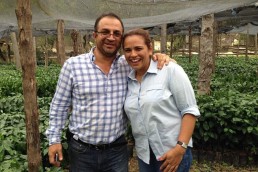
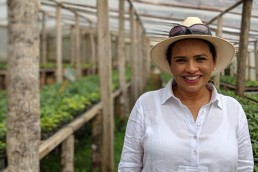
el puente: honduras.
origin: el regadillo, la paz, honduras
produced by: finca el puente – caballero family
processing method: washed
species: arabica
varietal: catuai
elevation: 1400-1650m above sea level
we’ve been buying coffee directly from Honduras coffee legends, Marysabel Caballero and Moises Herrera of finca el puente, for a few years now. this catuai is further proof of how their meticulous farming practices continue to result in outstanding coffees. it’s no surprise they’ve been past recipients of cup of excellence honours!
on the same day the coffee cherries are picked, they’re de-pulped in the afternoon & left in tanks for fermentation. once the fermentation process is complete, the coffee is washed and allowed to gently dry in various controlled conditions.
this coffee adds flavours of plum and toffee to the blend, with a rounded acidity and a natural sweetness.
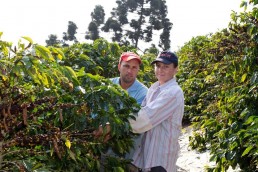

pedra grande: brazil.
origin: caconde, são paulo, brazil
produced by: luciano vicente – sitio pedra grande
processing method: natural
species: arabica
varietal: red catuai,
elevation: 1200-1350m above sea level
Luciano’s father, Antonio Vicente, came to the town of Caconde, when he was 15 years old. he bought a piece of land up the mountain from town, built a home & planted his coffee. he called it Vila Vicente, where Luciano and his seven siblings were born & raised, surrounded by coffee trees. in those days, his father’s coffee trees were treated as a commodity, they mixed the varietals together & sold it to the local co-op. 20 years ago, Antonio passed away & Luciano inherited 3 hectares of land & tried to continue what his father had taught him.
in 2014, João Hamilton, a neighbor of Luciano (and a producer we’ve bought coffee from in the past), told Luciano that his coffee trees had a big potential for producing specialty coffee. “João told me about FAF’s project, about taking care of the land & revitalizing the soil. decreasing insecticides and picking & drying at more ripe levels. Joõa told me that my land had good altitude and that I had to produce high quality coffee.”
Luciano listened & began arriving at 6am every day at his fields with new enthusiasm. he started cupping his coffees & learning to drink them properly. gradually, he developed a deep passion for his coffee fields. Luciano is part of FAFCoffees agronomist project with a focus on increasing quality & sustainable farm management. its been 7 years now without the use of glifosat in his soils & two years utilizing green fertilization with cover crops. the quality in the cup has followed in suit.
today, the coffee drank in the Vicente household is always the highest scoring lot from the crop. Luciano prides himself in saying that he himself planted, picked, roasted & brewed it when he serves visitors. one of his favorite things to do is to brew a thermos & take it up to the big rock at the top of his land (pedra grande). there he can gaze upon his land and let the sweetness of his hard work linger on his pallet. “when I’m up there I think about my father, about my childhood and I can realize that my life, as that of my wife and children is improving. i feel energized that i’m doing something good for my family and for our eco-system. then I come down from the rock full of energy. i know there’s always a lot of work ahead but, coffee is my life and its what I like to do. I try to live this in the most intense way possible.”
this excellent Brazilian coffee is hand picked selectively and slow dried on raised beds. it brings a smooth buttery mouthfeel, long aftertaste and the flavours of cacao & brown sugar.
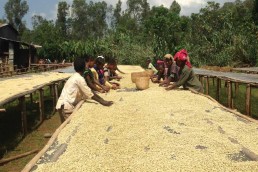
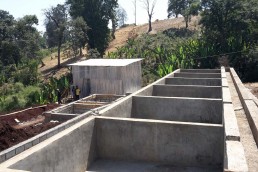
wolichu wachu: ethiopia.
origin: uraga, guji, ethiopia
producer: various smallholders
processing method: natural
species: arabica
varietal: bourbon, typica
elevation: 2100-2310m above sea level
the wolichu wachu washing station was founded in 2017 and serves 4,500 local smallholder producers in and around the town of Haro Wachu, in the Uraga district of Guji. The average producer here farms on half a hectare of land & delivers coffee in cherry form to the washing station, where it is processed as necessary. coffees in Ethiopia are typically traceable to the washing station level, where smallholder farmers -many of whom own less than 1/2 hectare of land, and as little as 1/8 hectare on average- deliver cherry by weight to receive payment at a market rate. the coffee is sorted & processed into lots without retaining information about whose coffee harvest is in which bag or which lot.
according to the washing station manager, 90 percent of the coffee delivered to the factory is bourbon, and 10 percent is typica: while these are two varieties better-known in central & south america, the same terms are used colloquially in Ethiopia to describe certain coffee-berry-disease-resistant cultivars. the Ethiopian “bourbon” & “typica” varieties are typically genetically removed from the ones found elsewhere around the world.
the wolichu wachu ethiopian coffee adds those big, ripe berry notes to the blend along with a syrupy & smooth body.
i’m sold…take me to the store asap!
